
An interesting story wafted into my email box the other day revolving around Generation Z. It turns out they may be ditching dating apps in favor of actual in-person meetups. That’s the conclusion of a new Eventbrite research study conducted among 1,001 Americans in March. A subsample of 21-35 year-olds was recontacted for this survey.
I wouldn’t be too concerned about the fates of Tinder, Bumble, and Hinge – just set. But the Eventbrite study indicates Gen Z (and Millennials) are seeking personal contact and connection, rather than swiping an app.
They call it “From URL to IRL” and it’s a fascinating look at changing sensibilities from a generation that has remained largely misunderstood.
that has remained largely misunderstood.
The study underscored the desire of Gen Zs, in particular, to experience “meet-cutes” – chance encounters with possible dates perhaps leading to partnerships. The term comes from the 2022 movie of the same name, starring Kaley Cuoco and Pete Davidson. It turns out the film has inspired many young people to seek out personal meet-ups.
And the Eventbrite study provided lists of where members of Gens Z and Y imagine having one of these encounters.
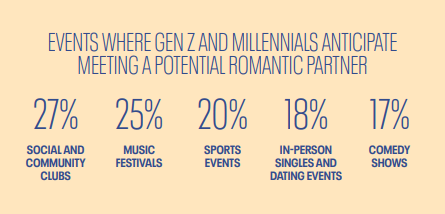
As I riffed through their findings, I couldn’t help but think about other data on young people we’ve seen in our various Techsurveys, showing a yearning for socializing.
In Public Radio Techsurvey 2023 conducted last summer, we asked a question about the desire for stations to be more visible in their communities at festivals, concerts, and events. We don’t have enough Gen Z in this study to break them out. But the enthusiasm for events and get-togethers among Millennials is hard to ignore.
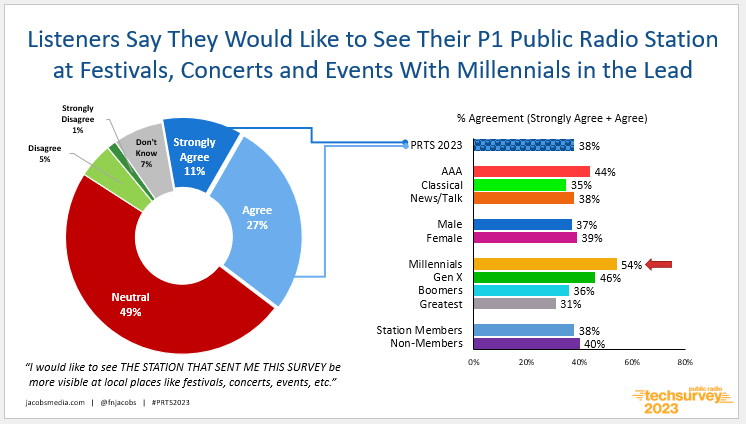
Would it surprise you to learn that when it comes to fundraising, Millennials are far more enthusiastic about stations creating social events with suggested donations than any of their older counterparts? They’re fine with supporting their local public radio station, but creating an opportunity to socialize with like-minded young people is a continuing theme.
We saw additional evidence for the need to connect with radio people in our commercial radio survey. In Techsurvey 2024, we developed a question series about attachment to on-air personalities, above and beyond just listening to them. Here’s the question:
“Other than listening on the radio, how interested are you in connecting with a favorite radio personality/show/host/DJ?”
As it turned out, the question generated more enthusiasm than I thought. All told, six in ten (60%) told us they’d be very/somewhat interested in a stronger connection with station talent.
It wasn’t until we looked at the demographics that we gained even more important insights. While Millennials and Gen Zs may be the least likely consumers to be active radio users, the ones who are listening are seeking out strong connections with personalities.
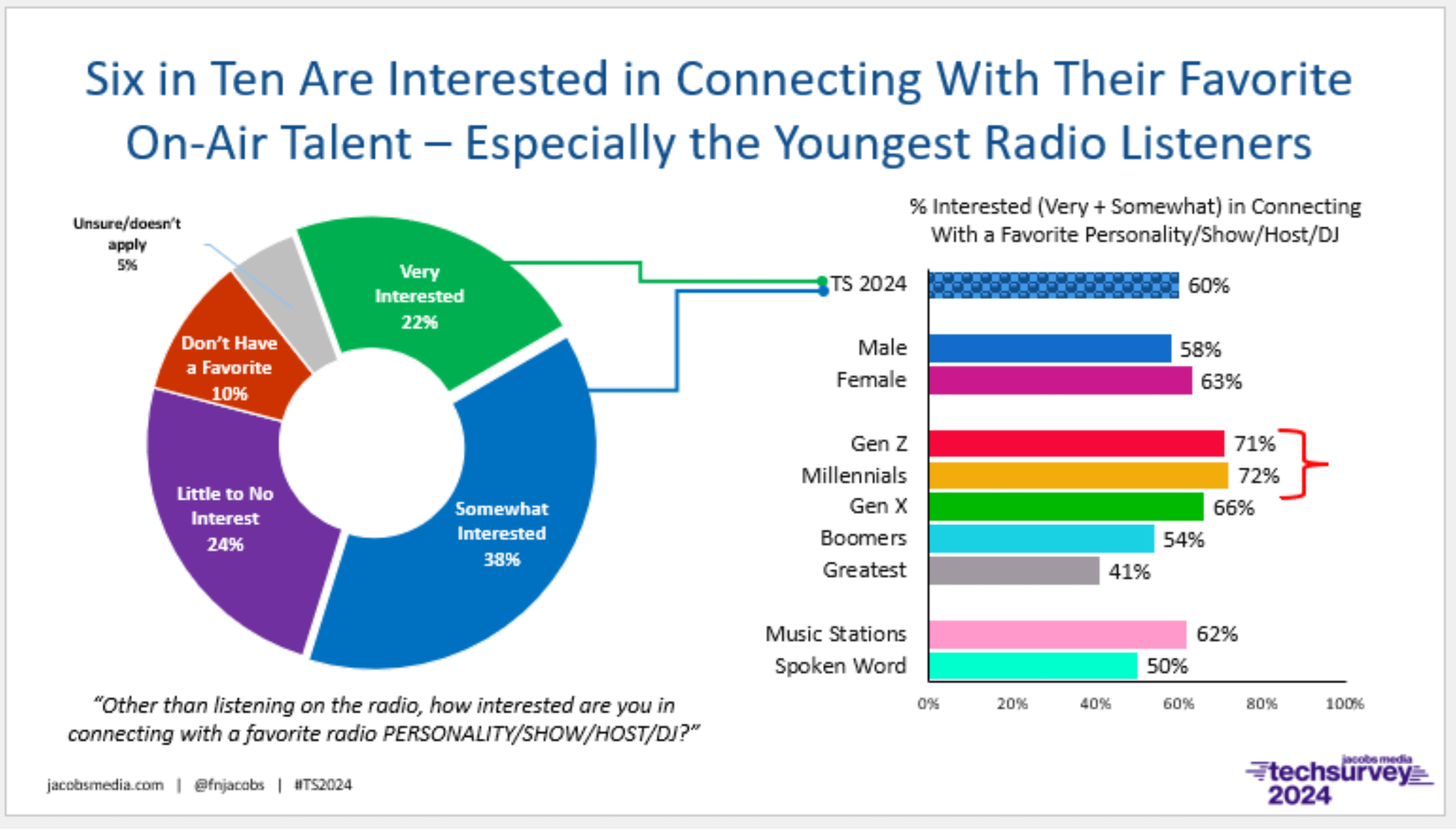
After all, many have grown up with music being presented impersonally – on utilitarian devices like iPods and smartphones; or being methodically presented in playlists created by algorithms on DSPs like Spotify or Pandora; or via intangible music files, rather than on albums and CDs.
There’s a reason why so many young people are buying turntables and collecting vinyl LPs and EPs. These formats are warm, personal, rich, informative, and tactile. There’s album art, lyrics, photos, and other immersive experiences beyond just listening. And you often enjoy listening to albums communally – in groups – sharing favorite albums and songs with those you like, friends, relatives, and partners.
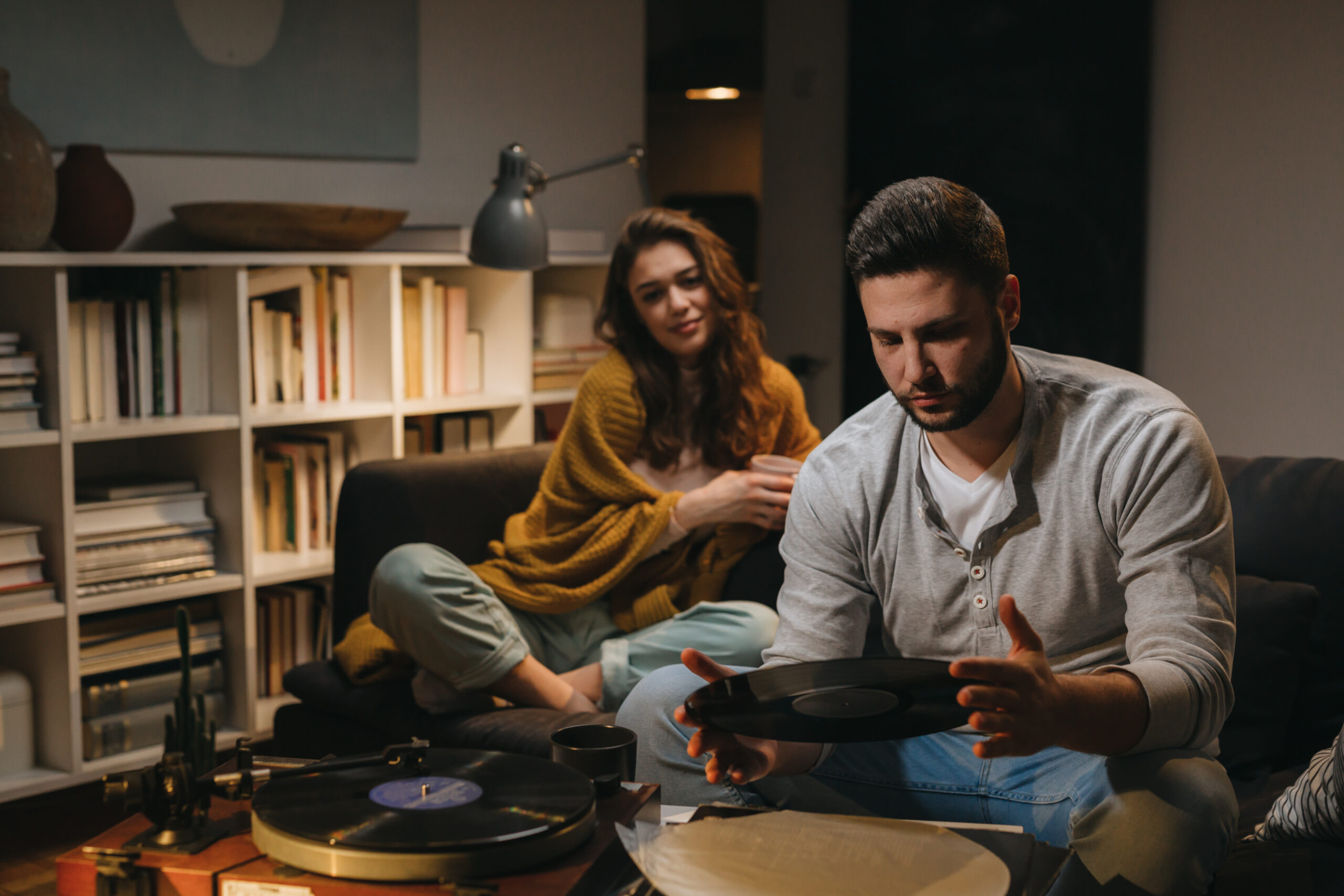
I also think this is what is happening at high school and college radio stations all over the U.S., and around the world. Young people see radio not just as a place to play music or read sports reports. Radio represents a mass medium where communities – however you define them – can come together.
As I look at more and more data revolving around Gen Zs, the more I see a generation that merely wants to connect, to socialize, and to frankly do a lot of the same things their parents and grandparents did – that is, Boomers and Gen Xers.
Sadly, most radio broadcasters are disinterested in the teen opportunity for myriad reasons. Or excuses.
Jaded execs remind us there are no “teen buys,” but isn’t there a chicken-egg about that? That is, if just a wee fraction of U.S. radio stations target teens, why should there be substantial advertising opportunities in the demo? Money follows audience.
Or the rationale that they’re all on Spotify and other streaming services anyway. But for most young people who use these DSPs, they are discussed like faceless utilities. They perform a service, they have a function, and they’re good at it – but provide little more.
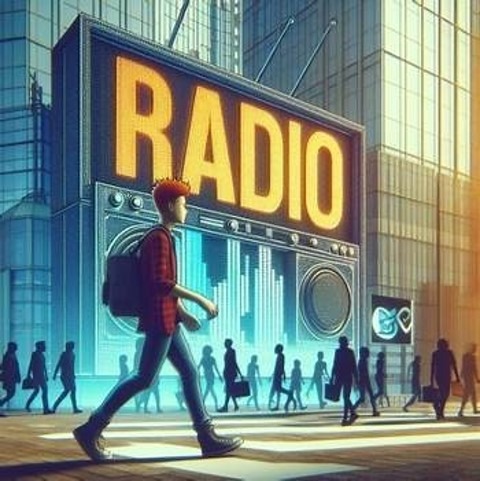 And then my favorite: “They don’t even know what a radio is.” Of course, they don’t. If there’s little there for them, why bother listening? Gen Zs know about every other gadget in the house, from the toaster oven to the leaf blower. If they get something out of a device, they know what it is and how to use it.
And then my favorite: “They don’t even know what a radio is.” Of course, they don’t. If there’s little there for them, why bother listening? Gen Zs know about every other gadget in the house, from the toaster oven to the leaf blower. If they get something out of a device, they know what it is and how to use it.
Maybe the reason fewer and fewer teens engage with radio is that there’s so little for them to grab onto. If broadcasters actually studied Generation Z as so many consumer brands wisely do, the pathways might be more obvious than most think. Eventbrite didn’t spend a king’s ransom on this research study. Broadcasters know very well that studying a demographic is table stakes for winning audience.
Young people aren’t that mysterious, nor are they hard to measure. Marketers simply need to do the work, ask the questions, and take the time to listen. As you’ve heard your entire career, this is not brain surgery.
The frustrating part is that radio has more inherent benefits for teens than any of us realize. That’s because when radio performs, it has so many key components teens crave – music, lifestyle, conversation, showbiz, events, community, and connection – the ability to bring them together and to “meet cutes.”
It’s sad to see broadcasters give up on the next generation – and their own pathway to a potentially viable future.
You can access the Eventbrite study here.
Originally published by Jacobs Media







